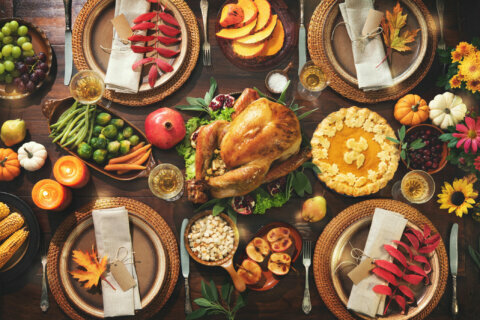Even though the nation’s top public health agency recently urged people not to travel for Thanksgiving because of the coronavirus pandemic, many students still plan on doing just that. So what can be done to keep everyone safe when students come home for the holidays?
The Virginia Department of Health recently released guidance for students and staff planning to return home. It includes tips for minimizing exposure risk before leaving school.
The VDH said students should consider getting tested for COVID-19 — either shortly before leaving or after arriving home — especially if they attend an institution where community transmission is high.
But remember that false positive and negative test results are possible. Students who have had close contact with someone with COVID-19 but test negative should still quarantine for 14 days after the last exposure. That could mean staying on campus longer.
Also, students should get a flu vaccine at least two weeks before returning home (although at this stage, that’s not possible for Thanksgiving) and, if possible, travel by car rather than public transportation like a plane or bus.
Another strategy is for students is to limit their interactions for 14 days, either before or after coming home. Minimizing social activities with family members is also important, especially if the student engaged in risky behaviors like not wearing a mask before coming home.
- Sign up for WTOP alerts
- Latest coronavirus test results in DC, Maryland and Virginia
- Curfew for unaccompanied minors at National Harbor going into effect
- CDC begs Americans not to travel for Thanksgiving
- Maryland reimposing coronavirus restrictions at 5 p.m.
- National Zoo, several DC museums to close amid rising COVID-19 cases
Looking for more information? D.C., Maryland and Virginia are each releasing more data every day. Visit their official sites here: Virginia | Maryland | D.C.
The VDH advises families to limit the size, frequency and duration of their social interactions. Crowds should be avoided and smaller groups are safer than larger groups. Fewer, shorter interactions are safer than frequent, longer ones. And outdoor gatherings are generally safer than indoor ones.
Other tips include:
- If possible, use a separate bedroom and bathroom for the first two weeks.
- Be particularly conscientious about following the core COVID-19 prevention steps when around people who are older, have underlying health conditions or are otherwise vulnerable to severe illness.
- Anyone who develops any COVID-19 symptoms, even if symptoms are very mild, should isolate from others and get tested as soon as possible.
Basic prevention steps to take, regardless of setting, include:
- Maintaining a safe distance. This means staying out of crowded places and keeping at least six feet away from others when possible.
- Wear a mask in public settings, even when distancing.
- Wash hands frequently with soap and water for at least 20 seconds. If soap and water are not available, hand sanitizer that contains at least 60% alcohol can be used.
- Clean and disinfect frequently touched surfaces often.
And everyone should stay home if:
- They are sick (even if symptoms are very mild).
- They have tested positive for COVID-19 on a viral test.
- They are waiting for COVID-19 test results.
- They have had close contact with someone with COVID-19 in the past 14 days.
The U.S. has more than 11.7 million confirmed cases of COVID-19, which has killed more than 250,000 Americans. The Centers for Disease Control and Prevention notes that roughly 40% of people who are infected may not have obvious symptoms but can still spread the virus.
Click here to view the CDC’s guidance for Thanksgiving travel.
- Tips for cooking (and saving) a smaller Thanksgiving feast
- Celebrating holidays on a smaller scale
- Thanksgiving food recipes
- Leftover recipes you may not have thought of
- For Thanksgiving Day, Zoom will lift its 40-minute time limit for free meetings
- Tips for cooking (and saving) a smaller Thanksgiving feast
- Celebrating holidays on a smaller scale
- Keeping Thanksgiving healthy: Nutritionists serve up some tips
- Forget sad Thanksgiving: early Christmas fever takes over
- Bring on the holiday cheer! Putting up decor early can boost mental health








